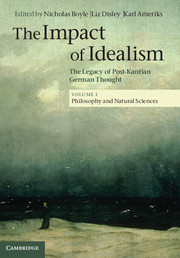Book contents
- Frontmatter
- Contents
- List of Illustrations
- List of Contributors
- Acknowledgements
- List of Abbreviations
- Foreword
- General introduction: the eighteenth and nineteenth centuries
- General introduction: the twentieth and twenty-first centuries
- Introduction: Idealism in the natural sciences and philosophy
- 1 Philosophy of natural science in Idealism and neo-Kantianism
- 2 The impact of German Idealism and Romanticism on biology in the nineteenth century
- 3 The unconscious: transcendental origins, Idealist metaphysics and psychoanalytic metapsychology
- 4 Nietzsche, Kant and teleology
- 5 Transcendental idealism, phenomenology and the metaphysics of intentionality
- 6 Heidegger and the impact of idealism
- 7 French Hegelianism and anti-Hegelianism in the 1960s: Hyppolite, Foucault and Deleuze
- 8 Scottish Idealism
- 9 ‘My station and its duties’: social-role accounts of obligation in Green and Bradley
- 10 Idealism and the origins of analytic philosophy1
- 11 Idealism and Pragmatism: the inheritance of Hegel's concept of experience
- 12 Reason's form
- Bibliography
- Index
- References
General introduction: the twentieth and twenty-first centuries
Published online by Cambridge University Press: 05 December 2013
- Frontmatter
- Contents
- List of Illustrations
- List of Contributors
- Acknowledgements
- List of Abbreviations
- Foreword
- General introduction: the eighteenth and nineteenth centuries
- General introduction: the twentieth and twenty-first centuries
- Introduction: Idealism in the natural sciences and philosophy
- 1 Philosophy of natural science in Idealism and neo-Kantianism
- 2 The impact of German Idealism and Romanticism on biology in the nineteenth century
- 3 The unconscious: transcendental origins, Idealist metaphysics and psychoanalytic metapsychology
- 4 Nietzsche, Kant and teleology
- 5 Transcendental idealism, phenomenology and the metaphysics of intentionality
- 6 Heidegger and the impact of idealism
- 7 French Hegelianism and anti-Hegelianism in the 1960s: Hyppolite, Foucault and Deleuze
- 8 Scottish Idealism
- 9 ‘My station and its duties’: social-role accounts of obligation in Green and Bradley
- 10 Idealism and the origins of analytic philosophy1
- 11 Idealism and Pragmatism: the inheritance of Hegel's concept of experience
- 12 Reason's form
- Bibliography
- Index
- References
Summary
From inauspicious beginnings to the ‘return of metaphysics’ – German Idealism at the turn of the century
At first glance, the impact of Idealism at the dawn of the twentieth century seemed to be on the wane. In America, George Santayana, a student of William James, spearheaded a common-sense return to naturalism and realism, attacking not only Idealism itself but also perceived Idealist elements in pragmatism. His five-volume Life of Reason (1905–1906) was an ambitious and broad-based contribution to philosophy, focusing not only on metaphysical and epistemological topics, but also on religion and literature. An early advocate of epiphenomenalism, that is, the view that mental events are caused by physical events and have no influence on subsequent physical events, Santayana's wide-ranging project could hardly have been more hostile to classical German Idealism. He was to exercise significant influence on subsequent figures in English-speaking philosophy, including Bertrand Russell, as well as on literary figures such as Wallace Stevens. In the German-speaking world, 1908 saw the first meeting of what would ultimately become the Vienna Circle, which would foster the development of the enormously influential logical positivist movement. As well as being a philosophical methodology, logical positivism was a fundamentally empiricist movement which saw all knowledge as proceeding from experience. In this sense, it too was inimical to German Idealism, and saw many of the tenets of the earlier movement as metaphysical and therefore meaningless statements. The logical positivist movement and German Idealism did not operate in entirely separate worlds, however, and many of the central questions and concerns of both were brought together in the work of Ludwig Wittgenstein and those who worked with him.
- Type
- Chapter
- Information
- The Impact of IdealismThe Legacy of Post-Kantian German Thought, pp. 41 - 61Publisher: Cambridge University PressPrint publication year: 2013

